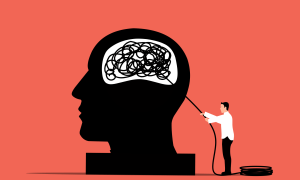Improving the mental health promotion model in schools: a priority challenge for the education community

The 'Escoles Sentinella' project detects that 12% of ESO students, 37% of Baccalaureate students and 47% of Vocational Training students have worsened their mental health as a result of COVID-19. This academic year, the project seeks to reach a consensus between the educational and scientific community and a wide range of social actors on proposals to improve the promotion of mental health in schools.
With the aim of monitoring and evaluating the impact of COVID-19 in schools, last academic year 2020-2021 the Government of Catalonia promoted the 'Escoles Sentinella' project, led by the Centre for Epidemiological Studies on HIV/AIDS in Catalonia (CEEISCAT) and with the collaboration of various leading Catalan scientific institutions, including the Living Lab for Health at IrsiCaixa, which participates in the framework of the European project CONNECT. Based on the results of the participatory research implemented last year in the 'Escoles Sentinella' and the surveys on the impact of the pandemic on the educational community, mental health was identified as a priority challenge. For this reason, this academic year's participatory research aims to reach a consensus on proposals for improving the model for promoting this health challenge in the educational environment.
The education community focuses on mental health
Last year, the Living Lab for Health at IrsiCaixa invited students and teachers from different schools to actively participate in the 'Escoles Sentinella' project to improve the COVID-19 prevention model in schools. Through a participatory research process, 22 teachers and 868 students developed 58 recommendations, subsequently validated by the scientific and educational community. The recommendations were grouped into five themes: participatory governance; adaptation of infrastructures; physical, mental and social health; communication and education; social inequalities. Of these, mental health was the theme under which the participants expressed most concern, and research on this topic has been prioritised this year. Another fact that supports the need to address mental health in the educational sphere are the surveys carried out by CEEISCAT in schools, which indicate that 36% of teaching staff, 37% of secondary school pupils and 47% of those in vocational training consider that their mental health has worsened as a result of COVID-19.
Participatory research to address a complex problem
Having identified the new challenge, the Living Lab at IrsiCaixa aims to involve the educational community and a wide range of professionals in a participatory research process to improve the model of mental health promotion in the educational environment. To achieve this goal, it is necessary to approach mental health as a complex problem in which many factors are involved and which must therefore be tackled from a systemic perspective. "We live in an interconnected world and the challenges are complex, so solutions obtained from a single perspective to change a specific aspect do not solve the problem. We propose to facilitate spaces for co-creation to promote changes at a collective level and work in a network so that the resolution of problems is carried out from the root and takes into account the interconnections of the different areas and actors of the system", explains Rosina Malagrida, head of the Living Lab of Health at IrsiCaixa, coordinator of the participatory research work package of the 'Escoles Sentinella' project and partner of the European project CONNECT.
During this academic year, therefore, the Lab again implements a participatory research process. At the beginning of this process, 6 discussion groups have been held with teachers, with 57 participants from 20 schools. The next objective is for the teaching staff themselves to replicate the activity with the pupils, and the pupils with their families. "This process manages to involve professionals, students and families and, in this way, obtain a list of recommendations co-created with a diversity of actors and which takes into account a wide range of perspectives to improve the current mental health promotion model," says Laia Vives, project manager of the Living Lab for Health at IrsiCaixa.
In total, the participatory mental health research process is expected to involve approximately 1500 students, 50 classes and 40 teachers. The study will culminate in a Scientific Congress on 2 June 2022 at which the students will present the recommendations to the scientific and educational community, professionals in the sector, as well as the public administration. Subsequently, further focus groups will be organised with mental health professionals to produce a list that integrates the perspectives of the different actors.
The implementation of participatory research also aims to improve science learning through the Open Schooling movement, promoted by the European Commission. This movement facilitates problem-solving activities in which students acquire knowledge and develop scientific skills and attitudes to address socio-scientific issues. To do so, they involve families and science professionals, among other social actors.
The participation of families will be key not only because of their contributions, which will enrich the results of the research, but also because it will facilitate dialogues on research among parents and children, which, according to recent scientific evidence, are essential to ensure a good perception of science and good learning by families and students.